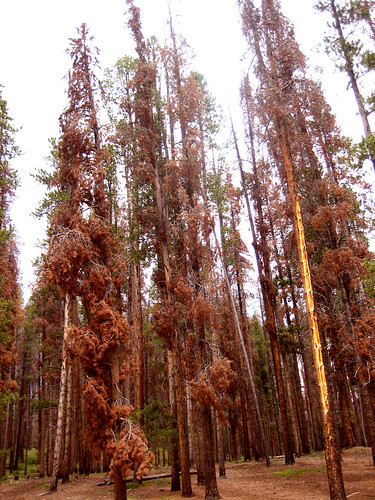Salvaging biofuel from the West's pine beetle devastation

Mountain pine beetles have been ravaging western forests. With poisoned sap, infected trees are left dry, red-needled, and dead.

Many scientists suggest global warming could be exacerbating the infestations, with warmer temperatures allowing the insect to move into previously inhospitable areas and shortening the beetle's life cycle by up to a year.
While Cobalt Technologies can't offer much to solve the pest problem, the California start-up might have something to offer climate change mitigation. The company has found a way to produce biofuel from the dead wood that pine beetles have left in their wake.
By converting sugars harvested from beetle-bitten lodgepole pines into n-butanol, Cobalt is trying to replace some of the petroleum and petrochemical materials in anything from gasoline to plastics to paint.
The process must first pre-treat the wood's toxic sap, which can be harmful to the bacteria used in the fermentation process.
In a statement CEO Rick Wilson says:
If we use only half of the 2.3 million acres currently affected in Colorado alone, we could produce over two billion gallons of biobutanol -- enough to blend into all the gasoline used in Colorado for six years.
Partnering with Colorado State University, Cobalt will test how well the gasoline-butanol mix will run in automobile engines. CSU's Ken Reardon, professor of Chemical and Biological Engineering:
If Cobalt can convert beetle-killed wood, it’s likely that the company can make biofuel from almost any cellulosic feedstock.
Sticking to the dead stuff—that can pose fire hazards to western communities—seems well enough for now. (Though salvaging the often remote trees could have its own environmental concerns.) Prior to experimenting with stricken pines, Cobalt was using mill residues and forest products from healthy trees to make their biobutanol.
Image: StuffEyeSee/Flickr
Via: Green Car Congress
This post was originally published on Smartplanet.com